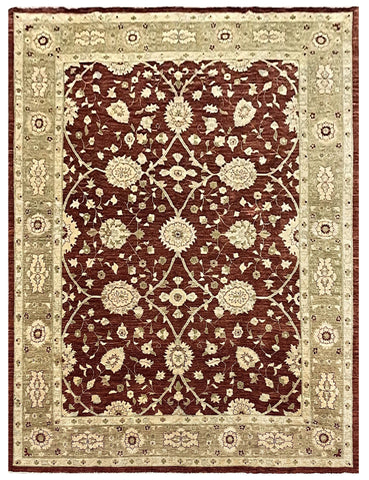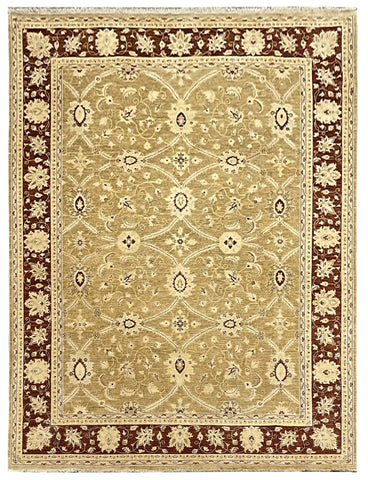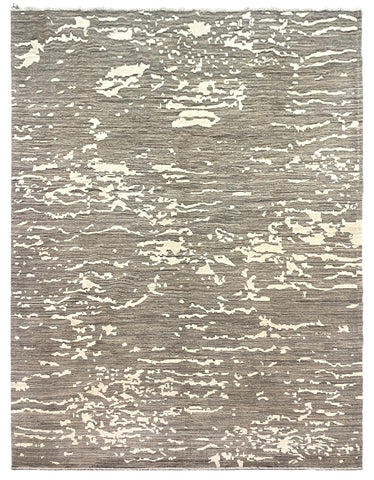23028 - Bakhtiar Hand-Knotted/Handmade Persian Rug/Carpet Traditional Authentic/ Size :12'7" x 8'11"
Previous Product Next ProductBabak's Oriental Carpets
1 in stock
Extra Large Carpet
NR: 23028
Location: Bakhtiar
Size: 12'7" x 8'11"
Country: Iran
Pile: Wool
Base: Cotton
Details:
Bakhtiaris are usually hand-knotted on a vertical loom; however, in the most isolated villages, the nomad-type ground loom is still used. Warp and weft are...
NR: 23028
Location: Bakhtiar
Size: 12'7" x 8'11"
Country: Iran
Pile: Wool
Base: Cotton
Details:
Bakhtiaris are usually hand-knotted on a vertical loom; however, in the most isolated villages, the nomad-type ground loom is still used. Warp and weft are usually in cotton but are sometimes in wool. The weft is composed of two threads and the knot is nearly always Turkish, exempting carpets made in the village of Shahr Kord which use the Persian knot. Each individual village or nomadic tribe has its own variation on the traditional schemes; the quality of the wool, the type of knot used and the fineness of the knotting vary significantly from village to village. However, all the carpets are reasonably sturdy and the wool pile is generally of medium depth and the density is from 80 to 200 knots per square inch. Normally, all such carpets are marked as “Bakhtiaris,” but sometimes they may be named after a specific village – e.g. Feridan, Farah Dumbah, Boldaji, Saman, Bain, etc. – and occasionally the more finely knotted items are referred to as Bibibaffs, which literally means “woman’s knot.”
Description:
Bakhtiaris are easily identifiable because of their special designs. The field on the carpet is almost always divided into squares or diamonds made to stand out by a plain outline. These geometric figures are decorated either with animal or plant motifs (particularly cypresses and flowering shrubs.) Each carpet may contain more than ten different designs. Another fairly common decoration is a formal repeated design of flowers and shrubs, which covers the whole field. Often these specimens contain a “tree of life” in the central part of the field.
Some Bakhtiaris are made by craftsmen in the village of Shahr Kord. These Bakhtiari tribesmen have given up their nomadic life and therefore their carpets reveal the influence of nearby Isfahan in the techniques employed, the use of the Persian knot and the floral design with a central medallion. The execution of this design is, however, more formal and betrays the nomadic origin of the craftsmen.
The border is typical of many Persian carpets from different regions: two narrow guards and a wide central band. The decorative motifs are greatly varied. The herati border motif (diamond-shaped geometric forms with floral heads both inside and surrounding) is usually used for carpets woven in Shahr Kord. In the nomadic carpets, particularly the older and antique ones, the border is often decorated with a serrated-leaf pattern. Another fairly common border is one where the decoration is a succession of cartouches in which the principal motifs of the ground decoration appear on a white background. All Bakhtiaris are in dark colors, deep red, yellow ochre, bottle green, dark brown and bright blue.
Price Range and Value:
MEDIUM TO MEDIUM/HIGH
Bakhtiaris can be exceptionally attractive, and are amongst the most collectable examples of contemporary Persian tribal weaving; consequently, their investment potential is sound.
For any further questions please call us at: (250) 480-7114
Articles & Videos
Wikipedia Entry (Article)
People & Culture (Video)
Landscape & Geography (Video)
Related Products
CAD $5,999.00 CAD $2,199.00
CAD $8,799.00 CAD $1,999.00
CAD $11,999.00 CAD $2,799.00
CAD $9,999.00 CAD $2,799.00
CAD $9,999.00 CAD $2,299.00
CAD $6,599.00 CAD $2,199.00

















